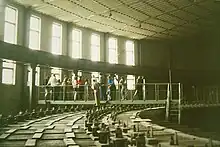
View from above the Synchrophasotron magnet yoke
The Synchrophasotron was a synchrotron-based particle accelerator for protons at the Joint Institute for Nuclear Research in Dubna that was operational from 1957[1] to 2003.[2] It was designed and constructed under supervision of Vladimir Veksler, who had invented the synchrotron independently from Edwin McMillan.
Its final energy for protons, and later deuterium nuclei, was 10 GeV.
References
- ↑ Baldin, A. M.; Semenyushkin, I. N. (1977). "Twenty years of the synchrophasotron of the JINR High-Energy Physics Laboratory". Soviet Atomic Energy. 43 (6): 1146. doi:10.1007/BF01117960. S2CID 98304922.
- ↑ "JINR Annual Report 2003, Veksler and Baldin Laboratory of High Energies" (PDF). Laboratory of High Energies, Joint Institute for Nuclear Research. 2003. Retrieved 29 Dec 2009.
- "Faces and Places / JINR celebrates 50 years of high-energy physics". Cern Courier. 4 Sep 2003. Retrieved 14 Dec 2009.
- A. M. Baldin; et al. (1971). "Acceleration And Ejection of Deuterons of the Dubna Synchrophasotron" (PDF). IEEE Transactions on Nuclear Science. NS-18 (3): 1024–1026. Bibcode:1971ITNS...18.1024B. doi:10.1109/TNS.1971.4326269.
- I. B. Issinsky; et al. (1994). "Beams of the Dubna Synchrophasotron and Nuclotron" (PDF). Acta Physica Polonica B. 25 (3–4): 673–680.
External links
Wikimedia Commons has media related to Synchrophasotron.
This article is issued from Wikipedia. The text is licensed under Creative Commons - Attribution - Sharealike. Additional terms may apply for the media files.